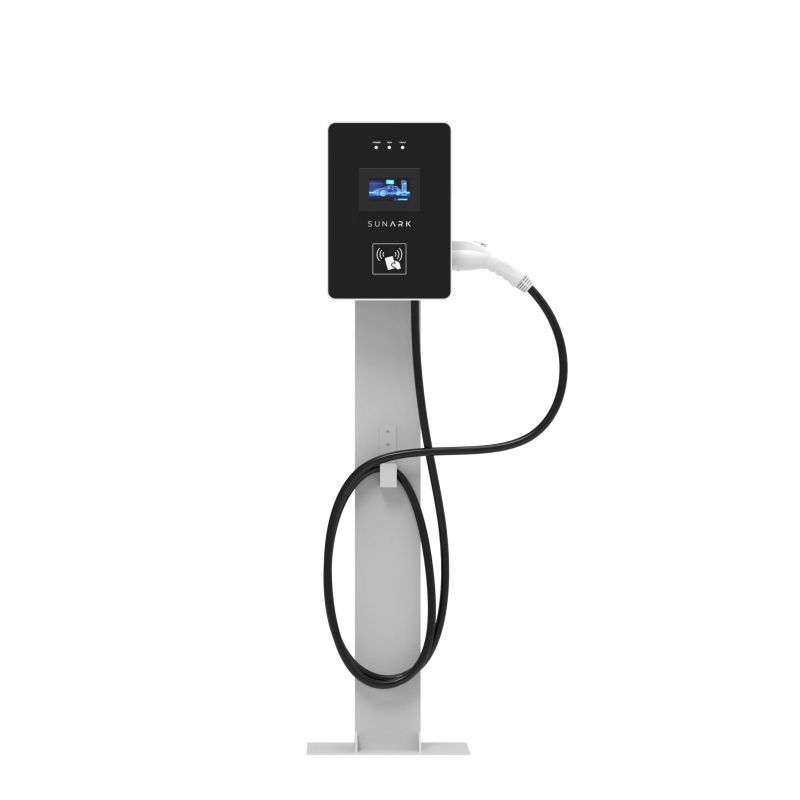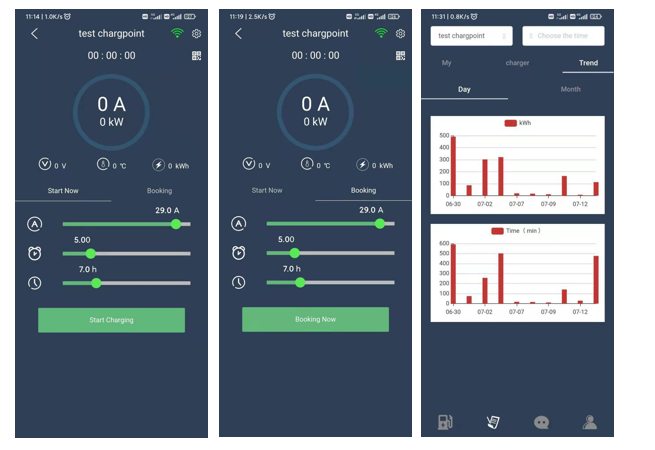"AC charger" is often used interchangeably with "charger" or "wall charger," as most chargers for small electronic devices operate on AC power. However, there are also chargers that directly use DC power, such as car chargers or solar chargers, which can convert the DC power from a car battery or solar panel into the appropriate voltage and current for charging devices.
Standard:
SAE Standard / IEC StandardConnector type:
Type 1 / Type 2Connector Mechanical Operating Life:
≥10000 times
An AC charger, also known as an Alternating Current charger, is device used to charge or power electronic devices converting the Alternating Current (AC) from a power outlet into the appropriate voltage and current required by the device. AC chargers are commonly used for charging smartphones, tablets, laptops, and other small electronic devices.
AC chargers typically consist of a power adapter with a plug that can be inserted into a standard wall outlet, and a cable with a connector that is compatible with the device being charged. The power adapter contains circuitry that converts the high voltage and frequency of AC power from the outlet into the lower voltage and direct current (DC) required by the device's battery.
When you connect a device to an AC charger and plug it into a power source, the charger converts the AC power from the outlet into DC power that can be safely used to charge the device's battery. The charger regulates the voltage and current supplied to the device to ensure safe and efficient charging.

The power range of AC chargers can vary depending on the application and the specific charger model. AC chargers for electronic devices like smartphones or laptops typically have power ratings ranging from a few watts (e.g., 5W or 10W) up to around 100W. These chargers are designed to be plugged into standard electrical outlets found in homes or offices.
When it comes to electric vehicle (EV) chargers, the power range is typically much higher. AC chargers for EVs are available in various power ratings, such as 3.7 kW, 7 kW, 11 kW, 22 kW, and even higher. The power rating determines how quickly the EV can charge. For example, a 3.7 kW charger will charge slower than a 22 kW charger.
It's worth noting that the power range of AC chargers may continue to expand as technology advances. Higher power chargers are being developed to enable faster charging times for EVs, allowing for shorter charging sessions and greater convenience for EV owners.

A DC fast charger, also known as a DC charge station, is a type of charger used for electric vehicles (EVs) that allows for faster charging compared to standard AC chargers. While AC chargers typically provide power in the range of a few kilowatts (kW) to tens of kilowatts, DC fast chargers can deliver power in the range of tens to hundreds of kilowatts.
The power range of DC charge stations can vary depending on the specific charger model and its capabilities. Generally, you may find DC fast chargers with power outputs ranging from 50 kW up to 350 kW or even higher. These chargers are commonly used for public charging stations, highway rest stops, and commercial or fleet charging infrastructure.
It's worth noting that the power output of a DC fast charger affects the charging speed of an EV. Higher-power chargers can replenish the battery more quickly, allowing for shorter charging times. However, the charging speed is also influenced by the EV's battery capacity and capability to accept high-power charging.

Monitoring EV chargers including various methods:
Charger Management Software: Many charging station providers offer software platforms that allow users to monitor and manage their EV chargers remotely. These platforms provide real-time data on charging sessions, energy usage, and payment processing.
Mobile Apps: Some charging station manufacturers provide companion mobile applications that allow users to monitor their charging sessions, check the status of chargers, and receive notifications or alerts.
Networked Charging Stations: Charging stations connected to a network can be monitored centrally by charging station operators or service providers. They can access data on charging status, energy consumption, and any faults or maintenance requirements.
Energy Management Systems: In commercial or public charging installations, energy management systems may be used to monitor and optimize the charging process. These systems can gather data from multiple chargers, manage charging schedules, and balance energy demand.
FAQs:
Q1: Do you support OEM/ODM?
A:Definitely, OEM&ODM service is supported with a certain quantity,including customize logo,package and label;
Q2: What's the production time?
A: The production time is normally 15 working days. but we will always prepare some stocks for popular models.
Q3: Can you provide DDP service?
A:Yes, if you are a personal customer and don't want to deal with the customs, we can provide DDP service to your address.
Q4: What about the warranty and how to claim?
A: Warranty period are 5 years since you receive the product, our professional after-sales team will deal with all warranty issues.